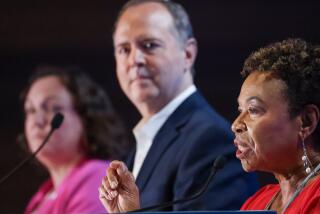Veteran Politician Now Walks Watchdog Trail
- Share via
Dale Bumpers is back on the campaign trail.
As anybody who keeps up with politics surely knows, the Arkansas Democrat retired in December, leaving public office after 24 years in the Senate and, before that, four years in the governor’s mansion.
Yet here he was in vote- and contribution-rich California for several days last week, meeting with potential supporters in San Diego and addressing luncheon gatherings in Beverly Hills and the Silicon Valley.
This time, however, he was not stumping for office, although some--including television producer Norman Lear--said they would like to see him run for president.
These days, Bumpers is pitching the Center for Defense Information, the Washington-based military spending watchdog organization that recruited him to be its director in January.
“We try to enlighten people on the difference between a sane defense and a bloated defense,” Bumpers said, speaking to a recent luncheon at the Beverly Hills Tennis Club.
Then he fired off a long list of needs, from education to family health insurance to the environment, that will go unmet if Congress sticks to plans to spend $1.8 trillion on defense over the next six years.
The luncheon, which launched Bumpers’ first road trip on behalf of the Center for Defense Information, was organized by Harold Willens, a retired Los Angeles businessman and longtime contributor to liberal causes. Willens helped retired Navy Rear Adm. Gene R. La Rocque found the center in 1972, and he and La Rocque told the guests why they wanted Bumpers at its helm.
“He knows the military and he knows the Congress,” La Rocque said, adding that Bumpers is “a hardheaded, practical realist. . . . He’s got a good, tough mind.”
Bumpers also has stature as a respected political figure and has oratorical skills that last caught the nation’s attention in January, with his rousing plea to end the impeachment trial of President Clinton.
In the Senate, he battled several military projects as wasteful and ineffective, including President Reagan’s “Star Wars” space-based defense system and the F-22 fighter planes with their $200-million price tags. He considers his new job “an extension of what I did for 24 years in the Senate.”
And though he says he quit politics in part because he hated “going out with my tin cup” to raise campaign contributions, asking for money for the center is quite another matter.
“Every contribution you take compromises you in some small way,” Bumpers, a longtime advocate of public political campaign financing, said in an interview. “And you always feel like you’re asking for money for yourself. I always felt queasy about that.”
The nonprofit, nonpartisan Center for Defense Information relies on grants and private contributions for its $2-million annual budget--a fraction of what arms manufacturers spend on lobbying, Bumpers is quick to note. Prohibited from lobbying, the organization concentrates on analyzing military spending, policies and weapons systems and on building public awareness of them.
“Our single opportunity is to educate, to enlighten people not to be anti-defense but to know what it is that makes a strong defense,” Bumpers said.
“You will never bring the American people to be analytical about defense spending until organizations like CDI convince them their priorities are being sacrificed” for unnecessarily costly military programs, he said.
He acknowledged that the center’s message has been a tough sell. It has had to battle the armaments lobby, a sometimes overeager Pentagon and politicians who don’t want military bases or military contracts stripped from their districts. And no one running for reelection wants to be branded soft on defense.
But Bumpers believes it is possible to change that: “People are beginning to understand that you can criticize the Defense Department without being accused of being unpatriotic.”
So Bumpers takes to the stump these days to foster what he hopes will become a “sea change” in public attitudes about defense spending and what it costs in terms of the nation’s ability to solve its most pressing problems.
On Wednesday, he traveled to DeAnza College in Cupertino for a midday speech to the Silicon Valley Forum of the Bay Area’s Commonwealth Club. About 100 members of the public affairs group, along with some of the community college’s history students, turned out to hear Bumpers.
After warming up his audience with a couple of jokes and anecdotes from his years in public life, Bumpers began his rapid-fire litany:
He talked about how the government could save $5 billion by eliminating just four of the Navy’s 18 nuclear-powered Trident submarines--a move the Navy supports but Congress opposes. About how “we spend twice as much [on defense] as all our potential enemies combined.” About how Sen. Jesse Helms (R-North Carolina) has bottled up in committee a nuclear weapons test ban treaty that other powers have promised to sign once the United States does. About how when NATO’s war over Kosovo is finished, it will have cost the United States much of its anticipated budget surplus.
Bumpers also talked about “the insanity of our inability to get rid of” nuclear weapons, then worked in pleas for everything from more civility in day-to-day life to stricter gun controls.
He conceded during a question-and-answer period after the speech that “I don’t have an alternative” to the bombing of Yugoslavia, but it might have been avoided had greater effort been put into first finding a diplomatic solution to the brutalities being inflicted on ethnic Albanians.
When asked about the poor intelligence work that led to the mistaken bombing of the Chinese Embassy in Belgrade, Bumpers quipped that the United States should have “taken a few bucks [of the trillions spent on defense in the last decade] and upgraded our mapping system.” With the embassy bombing, the United States has “given the Chinese an opportunity to get even with us” for persistent criticism of their government’s human rights violations.
Not all the questioners had national security issues on their minds. Some asked about gun control and campaign finance reform proposals. One wanted to hear the story behind Bumpers’ moving speech at the end of the Senate trial of the president. Someone else asked whether Congress had always been so intensely partisan.
“It’s gotten worse--much worse,” Bumpers replied.
There was one query the political veteran ducked.
Asked for a one-word response to whether he thought Hillary Rodham Clinton should run for the Senate from New York, Bumpers deftly turned the questioner’s attempt to pin him down into an escape hatch.
“I can’t answer that in one word,” he said. And he moved on to the next question.
More to Read
Get the L.A. Times Politics newsletter
Deeply reported insights into legislation, politics and policy from Sacramento, Washington and beyond. In your inbox three times per week.
You may occasionally receive promotional content from the Los Angeles Times.











